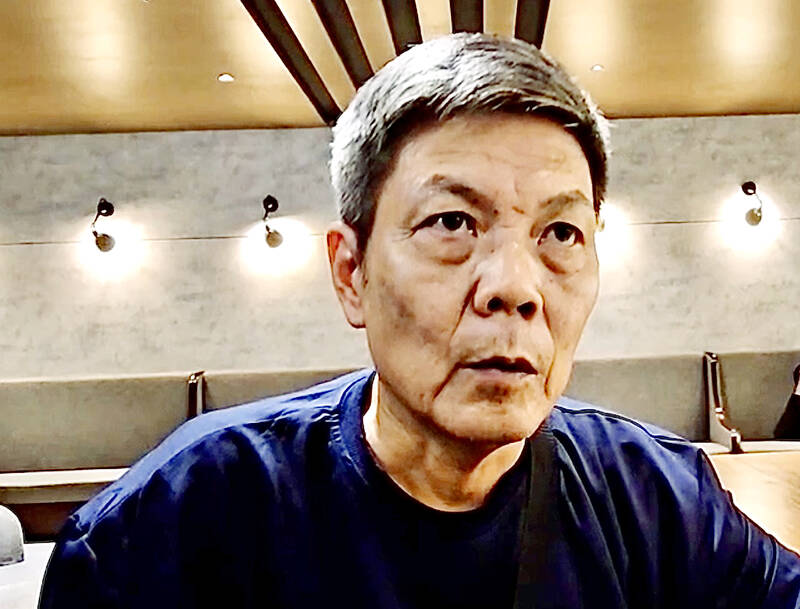Chinese dissident Chen Siming (陳思明) yesterday urged the government not to deport him back to China after he refused to board a plane at Taiwan Taoyuan International Airport during a stopover on a flight bound for China.
Chen, who has been arrested multiple times in China for publicly commemorating the Tiananmen Square Massacre, said he hoped that the US or Canada would grant him political asylum.
He has been on the run since escaping China two months ago, Radio Free Asia quoted him as saying in a report.

Photo courtesy of a reader
The Mainland Affairs Council said it is working to resolve the matter with government agencies, but did not elaborate.
The dissident had been in Cambodia and Thailand before reports that Lu Siwei (盧思位), a Chinese human rights lawyer, had been extradited from Thailand, prompting him to flee, Radio Free Asia reported.
“Chinese public security’s efforts to harmonize is becoming increasingly cruel and insane,” Chen wrote on X yesterday in a post that has since been deleted.
“They have freely summoned and detained me without any care to the proper legal procedures, confiscated my cellphone and tried to have me tested for mental conditions,” he said, adding that he was forced to leave his country due to intolerable conditions.
In a video attached to the post, Chen asked the US and Canada to grant him political asylum, and urged Taipei to not deport him.
A resident of Hunan Province, Chen marked the anniversary of the massacre by holding a sign in 2017, 2018, 2020 and 2021. He was arrested each time.
Chinese authorities have detained Chen ahead of the massacre’s anniversary in the past few years, he said.
“I did not escape to benefit from the economic conditions in the US, but to avoid the absence of human rights, dignity and rule of law in China, which has shown no cause for hope,” he said.
Chen said that he does not want to bring “trouble” to Taiwan.
Hopefully, Taipei could sympathize with his bid for temporary sanctuary in Taiwan, as he does not have a US visa and Beijing revoked his passport.
Chinese human rights advocate Wang Jianhong (王劍虹) in May said that Chen had written online that he was about to be detained by Chinese public security agents and had refused to delete the post, resulting in threats of a prison sentence.
New School for Democracy chairman Tseng Chien-yuan (曾建元) yesterday urged Taipei to help Chen as it has done in similar cases.
The government has helped people fleeing from persecution in China to obtain asylum in a third country, Tseng said, citing the cases of dissidents Yan Kefen (顏克芬) and Liu Xinglian (劉興聯) in 2019.
Chen should have the same rights as someone with refugee status certified by the UN, Tseng said.

SECURITY: As China is ‘reshaping’ Hong Kong’s population, Taiwan must raise the eligibility threshold for applications from Hong Kongers, Chiu Chui-cheng said When Hong Kong and Macau citizens apply for residency in Taiwan, it would be under a new category that includes a “national security observation period,” Mainland Affairs Council (MAC) Minister Chiu Chui-cheng (邱垂正) said yesterday. President William Lai (賴清德) on March 13 announced 17 strategies to counter China’s aggression toward Taiwan, including incorporating national security considerations into the review process for residency applications from Hong Kong and Macau citizens. The situation in Hong Kong is constantly changing, Chiu said to media yesterday on the sidelines of the Taipei Technology Run hosted by the Taipei Neihu Technology Park Development Association. With

CARROT AND STICK: While unrelenting in its military threats, China attracted nearly 40,000 Taiwanese to over 400 business events last year Nearly 40,000 Taiwanese last year joined industry events in China, such as conferences and trade fairs, supported by the Chinese government, a study showed yesterday, as Beijing ramps up a charm offensive toward Taipei alongside military pressure. China has long taken a carrot-and-stick approach to Taiwan, threatening it with the prospect of military action while reaching out to those it believes are amenable to Beijing’s point of view. Taiwanese security officials are wary of what they see as Beijing’s influence campaigns to sway public opinion after Taipei and Beijing gradually resumed travel links halted by the COVID-19 pandemic, but the scale of

A US Marine Corps regiment equipped with Naval Strike Missiles (NSM) is set to participate in the upcoming Balikatan 25 exercise in the Luzon Strait, marking the system’s first-ever deployment in the Philippines. US and Philippine officials have separately confirmed that the Navy Marine Expeditionary Ship Interdiction System (NMESIS) — the mobile launch platform for the Naval Strike Missile — would take part in the joint exercise. The missiles are being deployed to “a strategic first island chain chokepoint” in the waters between Taiwan proper and the Philippines, US-based Naval News reported. “The Luzon Strait and Bashi Channel represent a critical access

Pope Francis is be laid to rest on Saturday after lying in state for three days in St Peter’s Basilica, where the faithful are expected to flock to pay their respects to history’s first Latin American pontiff. The cardinals met yesterday in the Vatican’s synod hall to chart the next steps before a conclave begins to choose Francis’ successor, as condolences poured in from around the world. According to current norms, the conclave must begin between May 5 and 10. The cardinals set the funeral for Saturday at 10am in St Peter’s Square, to be celebrated by the dean of the College